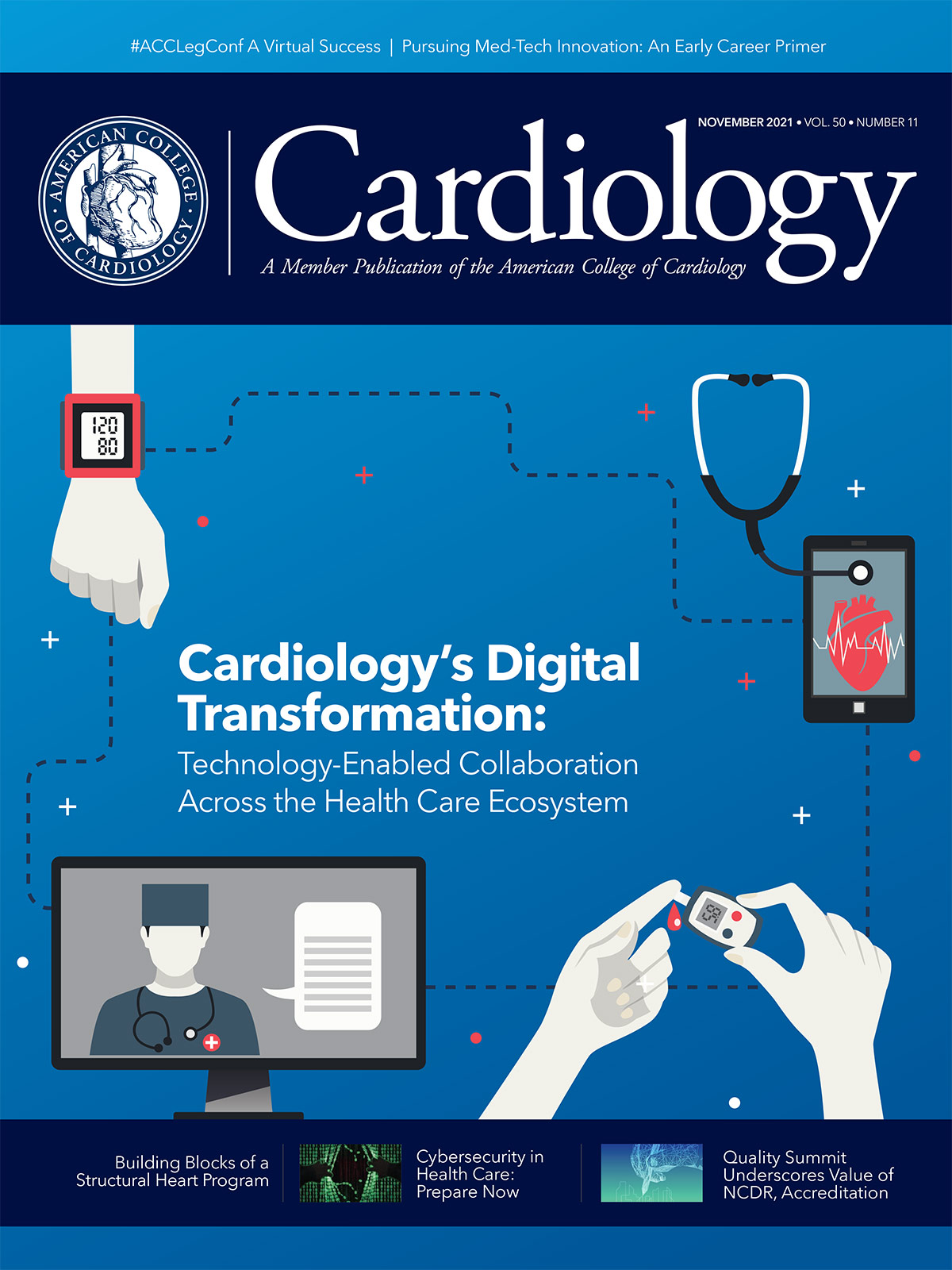Feature | #ACCLegConf A Virtual Success

More than 500 clinicians from across the U.S. and spanning the entire cardiovascular care team participated in ACC's Legislative Conference 2021 last month, using the time to further their understanding of health policy issues impacting the profession and patients and to meet with congressional leaders and their staff.
Highlights from the meeting, included a special health-policy focused Coffee With the ACC President featuring a dynamic discussion between ACC President Dipti Itchhaporia, MD, FACC, and Sen. Bill Cassidy, MD, from Louisiana. ACC HeartPAC members also got things cooking with a special "Chefinar" event and keynote focused on team building with former Olympic gymnast Dominique Dawes.
Itchhaporia along with ACC Health Affairs Committee Chair Samuel O. Jones, MD, MPH, FACC, and ACC CEO Cathy Gates kicked off educational sessions on Monday, Oct. 4 noting the importance of the Advocacy – and the Legislative Conference itself – in furthering the College's Mission and Vision. "While much has changed in our professional and personal lives since the start of COVID-19, the need for ongoing advocacy has remained constant," Itchhaporia said. "So much of transforming cardiovascular care and improving heart health is reliant on policies and programs determined by lawmakers and regulatory agencies."
Participants also took part in educational sessions with ACC Advocacy leaders and staff to gain greater insights on critical health policy topics including slated cuts to Medicare payments planned for January, support for cardiac rehabilitation and cardiovascular research funding, the challenges of administrative burden and more. These topics were then front and center during the nearly 300 meetings with U.S. Representatives, Senators and their respective staff members on Tuesday, Oct. 5.
In addition to health policy discussions, the Conference provided an opportunity to recognize ACC members, as well as members of Congress, for their leadership in advancing solutions to heart health. Donald R. Westerhausen Jr., MD, FACC, was recognized with the annual Dee Mooty Grassroots Award, for his tireless work on tobacco policies, while Rep. Garland Hale "Andy" Barr IV (KY) and Rep. Lisa Blunt Rochester (DE) received the Presidential Award for Distinguished Service for their respective support for policies that protect patient access to care.
Check out the following highlights through the lens of #ACCLegConf on Twitter. Access Legislative Conference sessions and view talking points and other resources at ACC.org/LegislativeConference.
Hashtag Highlights: Day 1
Thanks to everyone joining the #ACCCoffeeTable conversation this morning with Sen. @BillCassidy as we kick off #ACCLegConf 2021.👏More details: https://t.co/uxVgHNVB9B #ACCAdvocacy https://t.co/nGuoUVnNH4
— American College of Cardiology (@ACCinTouch) October 2, 2021
Fantastic @Cardiology #HeartPAC event during #ACCLegConf. Olympic champion gymnast (and Maryland native) @dominiquedawes sharing many insights on wellness, fitness, and leadership. @apmille1 @sandylewis @ditchhaporia @DPhilbinMD @ACCMaryland pic.twitter.com/SrSErPqmqw
— Joseph Marine (@DrJMarine) October 4, 2021
First time attending this unique #ACCLegConf. Excited to learn about #ACCAdvocacy. CV disease is the number 1 cause of death in US and Pakistan. Efforts need to be taken to remove barriers to health care. @ACCinTouch @Cardiology #CardioTwitter @ditchhaporia @GatesCathy https://t.co/nOrjl4k56W pic.twitter.com/EkqlTvVuoP
— Hunaina-WEAR A MASK-Shahab (@ShahabHunaina) October 4, 2021
ACC CEO @GatesCathy kicked off #ACCLegConf reminding participants about the importance of #ACCAdvocacy to the College's Mission & Strategic Priorities.
— ACC Advocacy (@Cardiology) October 4, 2021
Learn more about ACC Advocacy efforts: https://t.co/pAYVSqO1iJ. pic.twitter.com/2ZKPMfe3Yc
ACC #HeartPAC provides unique opportunities to amplify the voice of cardiology on Capitol Hill. U.S. members can learn more about getting involved at: https://t.co/OaaQgtuEQq #ACCAdvocacy #ACCLegConf pic.twitter.com/zii76ysC1N
— ACC Advocacy (@Cardiology) October 5, 2021
📣 It's time to act. Learn how to help ensure Medicare cuts don't threaten patient access and #CV care clinicians can continue providing critical care. https://t.co/vONCDJVfmY #ACCLegConf pic.twitter.com/oIRSg8OCxl
— ACC Advocacy (@Cardiology) October 5, 2021
Join us in congratulating 🎉 2021 #ACCLegConf Presidential Award Winners Rep. Garland Hale IV (@RepAndyBarr) and Rep. Lisa Blunt Rochester (@RepLBR). Thank you for all your inspiring work! https://t.co/wATqJSPFSd pic.twitter.com/shbBOl9xRx
— ACC Advocacy (@Cardiology) October 4, 2021
🎉Congratulations to this year's #ACCLegConf Dee Mooty Grassroots Award Winner Donald R. Westerhausen Jr., MD, FACC (@dwester001)! https://t.co/wATqJSPFSd pic.twitter.com/axLjQK5o7x
— ACC Advocacy (@Cardiology) October 4, 2021
Heard (Virtually) on the Hill: Day 2
@RepBonamici thank you for protecting access to Medicare, increasing access to cardiac rehab and extending telehealth beyond the pandemic. We so enjoyed meeting you virtually ! #ACCLegConf @ACCOregon @sandylewis @NanditaCGupta1 @FCM1880 pic.twitter.com/uxRgI8Bx7a
— Pooja (@poojaprasad91) October 5, 2021
Smiling faces tell the story: @RepDerekKilmer supports ALL of the healthcare issues we value most. #acclegconf October 5 2021 thank you for your time and caring. @GautamNayakMD @TimDewhurstFACC @steiner_md pic.twitter.com/qLNnJKzVI1
— Washington ACC (@WashingtonACC) October 6, 2021
Thank you to the FL senators for meeting the Florida ACC team yesterday lead by Dr Perloff & being supportive of CV Care issues : Medicare payment reforms, Tele-health , Administrative burden & Cardiac Rehab @FloridaACC #ACCLegConf #ACCAdvocacy #epeeps pic.twitter.com/CNHU8BL3Y3
— Naushad Shaik (@nshaik14) October 6, 2021
Thanks to our @OhioACC team for taking time to advocate for Heart Health for Ohioans with legislators today! Appreciate all you are doing for @Cardiology care!! @DrLaxmiMehta @OHCardioFIT @DaStultz @shobet5852 #ACCLegConf pic.twitter.com/a2tQQ23ifv
— Kanny Grewal MD (@DrGheartMD) October 6, 2021
It's a wrap! Thank you @MLHadleyDO, @drmalissawood, and @md_harrington for leading and guiding us through 2021 #ACCLegConf. Strong work @ACCMass #ACCadvocacy team 👏 #telehealth (HR 1332), #preauth reform(HR 3173) & expand access to #cardiacrehab (HR 1956) #CAROLAct (HR 1193) pic.twitter.com/so31Ec43Ud
— Vibha Amblihalli MD MPH (@vibha_md) October 5, 2021
Thanks to @RepWalorski (IN-2) for your support of protecting patient access to #telehealth #ACCLegConf @dwester001 @Vijayrao7474 @JClaryMD @inacc @Cardiology @ACCinTouch pic.twitter.com/1qCrMGE6iT
— Minnow Walsh, MD, MACC (@MinnowWalsh) October 5, 2021
@RepBradWenstrup Thx Casey Quinn 4 talking w/ACC! Thx for supporting preventing Medicare reimbursement cuts, HR3173/ HR1193 >∇ PriorAuth burdens/∆ funding for❤️️valve research!! Pls support HR 1956>∆ access to ❤️️rehab / HR 1332/366> ∆ access to care w/📞health #ACCLegConf pic.twitter.com/qrp9QT883z
— Christina M. Fink (@ChristinaFinkMD) October 5, 2021
#ACCLegConf #accadvocacy
— Kamala Tamirisa MD (@KTamirisaMD) October 5, 2021
Thank you!@RepBethVanDuyne for ur time & support!
Great day team #TCACC @txchapteracc @shelleyhallmd @km_shaffer @RickSnyderMD Drs. Soleman & Rohan Mehta. @SmadarKort #WICAdvocacy @marybyrnes_ @noonansj86 @sandylewis @ACCinTouch pic.twitter.com/2uLxp66K8O
Excellent discussions with our WA Representatives about important #Cardiology issues! #ACCLegConf @ACCinTouch @GautamNayakMD @LiannaSC @FimaMDMS @ruchikapoor @DerekKilmer @RepKimSchrier pic.twitter.com/MYtY5IOSWe
— Jill M. Steiner MD (@steiner_md) October 5, 2021
Thanks to @SenatorHagerty for meeting with@TNChapterACC and for his support of telemedicine and patient access. @a_l_bailey @Mike_Mikolaj @nbwiggins @SamOJonesMD @Cardiology #ACCLegConf pic.twitter.com/IDu0bE9CMw
— TN Chapter- ACC (@TNChapterACC) October 5, 2021
Thank you @RepAndyHarrisMD for meeting with @ACCMaryland today during #ACCLegConf. We appreciate your support of Bera-Bucshon payment fix and #PriorAuth reform, and the expertise you bring to Congress as a physician-legislator. @Cardiology @jae_patton @GarimaVSharmaMD @sxz110 pic.twitter.com/2ZCDoIODfN
— Joseph Marine (@DrJMarine) October 5, 2021
Appreciate everything @SenWarren and her team are doing for healthcare of Americans! We appreciate your support! @Cardiology at its best! #ACCLegConf @ACCMass @SaurabhSDani pic.twitter.com/tHu1MFPjHr
— Yash Jobanputra MD (@YashJobanputra7) October 5, 2021
Thank you @RepJerryCarl for meeting with us today as we advocate for our patients access to care through maintaining telehealth services, decreased administrative burden from prior authorization, and preventing significant Medicare payment cuts. #ACCLegConf #ACCAdvocacy pic.twitter.com/E0KfkYL4G2
— Sean Dunn, MD (@DrSeanDunn) October 5, 2021
See you next year!
Thanks to all who participated in this year's #ACCLegConf! Your voices are crucial to advancing #healthpolicy solutions that help us transform #CV care & improve heart health. Save the date for next year's conference Oct. 16 - 18, 2022. https://t.co/wATqJSy4tD #ACCAdvocacy pic.twitter.com/FgVz0ieB2X
— ACC Advocacy (@Cardiology) October 5, 2021
Prior Authorization Legislation Introduced in the Senate
ACC-supported legislation to reform the Medicare Advantage (MA) prior authorization process was introduced by Sens. Roger Marshall, MD (R-KS), Kyrsten Sinema (D-AZ), and John Thune (R-SD) late last month. The bill, called the Improving Seniors' Timely Access to Care Act of 2021 (S. 3018), was one of the priority issues discussed with congressional delegations during the 2021 Legislative Conference The ACC has been working with more than 400 state and national organizations, as well as key members of Congress, on the legislation for more than two years. The companion bill, H.R. 3173, was reintroduced in the House earlier this year. Specifically, the legislation would:
- Establish an electronic prior authorization process to streamline approvals and denials
- Establish national standards for clinical documents that would reduce administrative burdens on health care providers and MA plans
- Create a process for real-time decisions for certain items and services that are routinely approved
- Increase transparency between MA plans, health care providers and patients
- Ensure appropriate care by encouraging MA plans to adopt policies that adhere to evidence-based guidelines
- Require beneficiary protections that would ensure the electronic prior authorization serves seniors first.
"Prior authorization is a significant barrier to patient access in today's health care and the ACC has been committed to driving prior authorization reform to improve patient care and reduce administrative burden," said ACC Health Affairs Committee Chair Samuel O. Jones IV, MD, MPH, FACC. "That's why the ACC is proud to see the Senate introduction of the bipartisan legislation. It will help reduce administrative burdens that hinder optimal care and ensure our patients are not only getting the care they need, but also when they need it."
Two Advocacy Priority Bills Under Review in House
Two priority pieces of legislation for ACC Advocacy continue to gain traction on Capitol Hill following the ACC's 2021 Legislative Conference and meetings with key lawmakers.
Both the Cardiovascular Advances in Research and Opportunities Legacy Act (CAROL Act) (H.R. 1193) and the Increasing Access to Quality Cardiac Rehabilitation Care Act of 2021 (H.R. 1956) were topics of discussion at an Oct. 20 House Energy and Commerce Committee public health hearing and subsequent conversations among the Committee continue.
The CAROL Act would authorize a grant program administered by the National Heart, Lung, and Blood Institute to support research on valvular heart disease (VHD) and encourage the use of technological imaging and precision medicine to generate data on individuals with VHD. In addition, the legislation would convene a workshop of subject matter experts to identify research needs and opportunities and instruct the Centers for Disease Control and Prevention to create education and public awareness programs regarding symptoms of VHD and effective strategies for preventing sudden cardiac death.
The cardiac rehabilitation (rehab) legislation would accelerate and expand the ability of physician assistants, nurse practitioners and clinical nurse specialists to supervise cardiac rehab programs under Medicare. Under the legislation, these practitioners would be able to administer programs in their offices, prepare and sign treatment plans and prescribe exercise. The bill would expedite the effective date of these changes to Jan. 1, 2022.
Stay tuned to the Advocate newsletter on Thursdays and @Cardiology on Twitter for ongoing updates.
Efforts Underway to Stop Medicare Cuts
Thanks in large part to efforts from ACC's Legislative Conference and other grassroots efforts, 247 members of Congress signed on to a letter led by Reps. Ami Bera, MD (CA) and Larry Buschon, MD (IN) urging House leadership to stop Medicare payment cuts slated for Jan. 1, 2022. The cuts, which are the result of an array of significant reductions due to a series of statutory and regulatory provisions, would exacerbate financial uncertainty and further threaten patient care at a time when cardiovascular clinicians are still on the frontlines of the COVID-19 pandemic. The ACC continues to be actively engaged in communicating with Congress to convey how detrimental these cuts will be to patient care. Look to the Advocate newsletter and @Cardiology on Twitter for additional opportunities to weigh in with members of Congress as discussions continue.
Clinical Topics: Arrhythmias and Clinical EP, Cardiovascular Care Team, COVID-19 Hub, Diabetes and Cardiometabolic Disease, Prevention, Valvular Heart Disease, SCD/Ventricular Arrhythmias, Exercise
Keywords: ACC Publications, Cardiology Magazine, COVID-19, Tobacco, Cardiac Rehabilitation, Nurse Clinicians, Public Health, Leadership, Traction, Medicare Part C, Prior Authorization, Uncertainty, Social Media, Exercise, Educational Personnel, Patient Care, Physician Assistants, Heart Valve Diseases, Health Policy, Centers for Disease Control and Prevention, U.S., Cardiology, Nurse Practitioners, Awards and Prizes, Death, Sudden, Cardiac, Reference Standards, Electronics, Cooking, Health Services Accessibility
< Back to Listings

